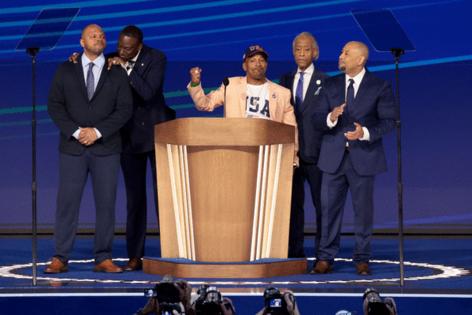Trump loses bid to end 'Central Park Five' defamation case
Published in Political News
WASHINGTON — A federal judge denied President Donald Trump’s request to dismiss a lawsuit over comments he made last year about five men who were wrongly convicted in the 1989 jogger rape case and came to be known as the “Central Park Five.”
U.S. District Judge Wendy Beetlestone on Thursday ruled that the case accusing Trump of defaming and portraying the men in a false light could go forward. She wrote that Trump’s statements could be “objectively determined” to be false.
The case is one of the last remaining legal fights that followed Trump back to the White House. Unlike the federal prosecutions, which were dropped by the U.S. Justice Department in the fall, Trump’s reelection didn’t automatically end pending civil cases.
Shanin Specter, the lead attorney for the men, now known as the "Exonerated Five," said in a statement that they “are gratified by the court’s ruling and thorough analysis and look forward to discovery, trial and the ultimate vindication of these five fine men.”
Beetlestone did dismiss a claim accusing the president of intentionally causing emotional distress.
Trump’s attorney, Karin Sweigart, said that the lawsuit is “another unfounded and meritless attack” on the president.
“We firmly believe the entire case should have been dismissed and will continue fighting to protect the First Amendment rights of not just the President, but all Americans,” she said in a statement.
The men, who were teenagers when they were arrested, filed a lawsuit last year in federal court in Philadelphia claiming that Trump defamed them by saying during a September debate that they had pleaded guilty when they hadn’t. Trump also made erroneous comments during the debate suggesting someone had been killed during the 1989 incident.
The five men were found guilty at trial but those verdicts were overturned in 2002 after DNA evidence linked another person to the attack on the jogger. New York City later settled a civil lawsuit brought by the men for $41 million.
Beetlestone also said that the men had raised a plausible claim that Trump spoke with “actual malice” — a legal term meaning that he made the statement even when knew it was false or recklessly disregarded the truth — given his awareness of the facts of the case. She noted that during a hearing, Trump’s lawyer conceded that his client was “closely familiar with plaintiffs’ not-guilty plea, conviction, and subsequent exoneration, such that he knows that plaintiffs did not plead guilty or hurt anyone.”
Trump’s attorneys had asked the judge to dismiss the case on several grounds. They argued that his comments should fall under Pennsylvania’s “anti-SLAPP” law that protects people from lawsuits over constitutionally protected speech. Trump was discussing matters of “public concern” and explaining why he’d placed a newspaper ad shortly after the attack that called for a revival of the death penalty based on his opinion about the information available at the time, they said.
As for the specific statements, Trump’s lawyers argued that when he falsely said the men had pleaded guilty and that the victim was killed, those comments were “substantially true” because he was referring to confessions during the initial investigation and the victim’s severe injuries.
Lawyers for the men countered that there was no ambiguity, and that “whether someone ‘pled guilty’ to having ‘killed someone’ is a factual statement that can be proven true or false.”
©2025 Bloomberg L.P. Visit bloomberg.com. Distributed by Tribune Content Agency, LLC.




























































Comments